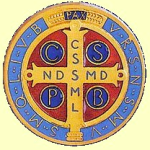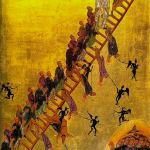“Thou Art Peter”
The text we’ve now reached is Mark’s parallel to Matthew 16.13-28. This is where the famous verse that says “Thou art Peter [Rock], and on this rock I will build my Church,” etc. Mark provides less detail, mentioning only Jesus’ initial question and St. Peter’s answer, the latter slightly shorter than it is in Matthew. It then skips directly to the bit where St. Peter embarrasses himself; the praise of the special faith Peter has received from the Father, and the awe-inspiring description of the authority to bind and loose that is bestowed upon him, are completely absent. (I covered some of the differences several months back, when we had St. Mark’s account of the Transfiguration for the Second Sunday in Lent—St. Peter’s profession of faith and the Transfiguration are thus positioned in all three Synoptics.)
Sidebar: here, as so often, John is the odd duck; he has neither the pericope of St. Peter’s profession of faith, nor that of the Transfiguration. Multiple characters (notably SS. John the Baptist, Bartholomew, Martha, and Thomas, as well as Peter) make Petrine-level professions of faith, starting as early as the first chapter; this first chapter is also where Peter receives his name. The scattering of these professions throughout the book doubtless aligns with the court theme of John, and implies that they are “witnesses for the defense.” Furthermore, the specific moment at which St. Peter makes his confession in John is just at the end of chapter 6, after the Bread of Life Discourse, which we discussed a couple posts ago.
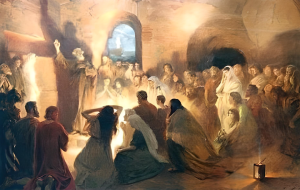
St. Peter Preaching the Gospel in the
Catacombs, late 19th/early 20th c., by Jan
Styka. Peter probably never did this,1 but it’s
a lovely work regardless.
What, if anything, the author is saying by bringing it up there, I’m not sure. As mentioned, the whole Gospel of John seems suffused with its light, yet he is the only evangelist who does not recount the Transfiguration; at the same time, the Bread of Life Discourse is all about how this “living bread that came down from heaven” is in fact his flesh, even though the thing that the New Testament refers to as his flesh elsewhere appears as an ordinary piece of bread. I dunno, might be some kinda resonance there I guess.
If the tradition is correct that St. Peter himself is the memoirist behind Mark, his omission of the “thou art Peter” declaration was presumably due to one of two things: 1) embarrassment at the scolding he got from Jesus in this story; or, 2) self-consciousness at the grandiose terms of the office he was appointed to. I find that second possibility intriguing.
Mark 8.27-35, RSV-CE
And Jesus went on with his disciples, to the villages of Caesarea Philippia; and on the way he asked his disciples, “Who do men say that I am?” And they told him, “John the Baptist; and others say, Elijah; and others one of the prophets.”b And he asked them, “But who do you say that I am?” Peter answered him, “You are the Christ.” And he chargedc them to tell no one about him.
And he began to teach them that the Son of man must suffer many things, and be rejected by the elders and the chief priestsd and the scribes, and be killed, and after three days rise again. And he said this plainly. And Peter took him, and began to rebukec him. But turning and seeing his disciples, he rebukedc Peter, and said, “Get behind me, Satan! For you are not on the side of God, but of men.”e
And he called to him the multitude with his disciples, and said to them, “If any man would come after me, let him deny himself and take up his cross and follow me. For whoever would save his lifef will lose it; and whoever loses his lifef for my sake and the gospel’s will save it.”
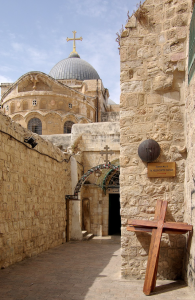
The black disc on the wall marks the Ninth
Station of the Cross on the actual Via
Dolorosa. Photo by Berthold Werner, used
under a CC BY-SA 3.0 license (source).
Mark 8.27-35, my translation
And Jesus and his students came out to the villages of Cæsarea Philippia; and on the way, he questioned his students, saying to them: “Whom do people say I am?” They told him, “John the Immersionist, or others, Elijah, and others, one of the prophets.”b And he questioned them: “And whom do you say I am?” Rocky replied, telling him: “You are the anointed one.” And he ratedc them, lest they tell anyone about him.
And he began to teach them that the Son of Man must suffer many things, and be condemned by the elders and high priestsd and scribes, and be killed, and after three days rise again; and he was telling them this openly. Then, taking him aside, Rocky began to ratec him. But turning around and looking at his students, he ratedc Rocky, and told him: “Get behind me, Satan, because you do not have God’s things in mind, but man’s.”e
And calling together the crowd, with his students, he said to them: “If someone wants to come along after me, he must reject himself and pick up his cross and follow me. For whoever wants to save his lifef will destroy it; yet whoever will destroy his lifef because of me and the good news, he will save it.”
Textual Notes

St. Peter as depicted in the Nuremberg
Chronicle (1493)
a. Cæsarea Philippi: This city (which was of immense antiquity) was originally called Panion, or Panias, in reference to the Greek nature-god Pan. It was located near the northern end of the modern Golan Heights, and is to this day the site of a spring which is the source of the Banias River, one of the important headwaters of the Jordan. At this time, Cæsarea Philippi lay in the orbit of the Decapolis, and a large temple to Pan could be found in the area.
b. John the Baptist; and others say, Elijah; and others one of the prophets/John the Immersionist, or others, Elijah, and others, one of the prophets: “Immersionist” as an alternative to “Baptist” or “Baptizer” was my attempt at selecting a word that conveyed the full meaning of the Greek without sounding ridiculous; I’m not at all sure I achieved either goal, really. The only alternatives I could come up with, however, were “dipper” (no), “dunker” (the nickname of an Anabaptist group, which I thought might cause confusion), or “bather” (which is really about swimming, not immersing).2
“Elijah” was of course expected to prepare the way for the Messiah; the relevant passage in Malachi doesn’t make it clear whether this “coming of Elijah” was essentially metaphorical, or something more like a reincarnation, or what. Jesus, and at least some others independently of him, identified the Baptist as “Elijah,” but I don’t know how widely it was known that Jesus taught this about St. John the Baptist. Given that he tells the Big Three this in private (just after the Transfiguration, while they’re still making their way down the mountain), I’d assume it was not common knowledge until after Pentecost.

Jeremiah on the Ruins of Jerusalem (1844),
by Horace Vernet
As for “one of the prophets,” I get the impression from Mark that this meant a new prophet (“one of the prophets” in the sense a donut from coffee hour is “one of the donuts,” as opposed to being a specific one). Curiously, this is a contrast with Matthew; he adds “Jeremiah or one of the prophets,” suggesting that it was individual prophets (“this one of the prophets as contrasted with that one of them”). Only Jeremiah is so honored.
c. charged/rated: Here, in response to a word I found frustrating to render, I made a choice that’s—look, we should just talk about it.
The troublesome vocab item is ἐπιτιμάω [epitimaō]—a verb with the irritatring habit of being its own antonym. (“Cleave” is the famous example of this in English.) It is related to τιμή [timē], meaning “honor, worth, value,” etc.; by way of the “value” sense of the word, the verb came to be used for assessing the value or price of something, as well as for “coming to a verdict about” something or someone. From this point, you can probably see how it comes to means both “to value, honor” and “to rebuke.”
So far so bad. What’s more questionable is my choice of translating it with rate, an increasingly rare English verb (except in the extended form berate, of roughly the same meaning) that, so far as I know, isn’t really used in American English at all.3 Of course, its meaning will probably be clear in a phrase like “give X a rating”—but only for the same reason that we all get Peter Sellars’ drift in Dr. Strangelove when he threatens to “give [the uncooperative soldier] such a pranging, you’ll be lucky to still be wearing the uniform of a bloody toilet attendant,” even though most of us have never heard the word prang before or since. I decided to chance it, but I’m not confident in the decision.

Anonymous artist’s rendering of the Sanhedrin,
created for an 1883 encyclopedia
d. chief priests/high priests: I have more or less invariably seen this translated as “chief priests,” and that’s a perfectly correct translation. However, it crossed my mind to wonder whether this is merely a generic reference to “the leading” priests, or perhaps something more particular: an allusion to the fact that, during this period, there were multiple high priests—only one actually served at a time, but the civil rulers (both those of the Herodian dynasty and the Romans) appointed and deposed high priests fairly freely, and former high priests seem to have retained the title and prestige. (This is why Annas and Caiaphas, who at the time were a former and current high priest respectively, both hold distinct trials of Jesus in the Passion of John.)
e. you are not on the side of God, but of men/you do not have God’s things in mind, but man’s: Though addressing a person as Satan is a fairly negative remark to make anyway, the RSV’s rendering here strikes me as a trifle harsh. The verb of the sentence is φρονέω [froneō], which means “to think; to intend, be minded to; to take the side of,” and a few other things. The RSV’s choice, then, is defensible; mine is more literal in mentioning “things,” a slightly-free way of rendering the definite article in this context.4 Given the possible, even presumable, long-term implications of “taking the side of” the Enemy—which we know from the subsquent history of St. Peter are not what our Lord was talking about—the slight freedom seemed to me preferable.
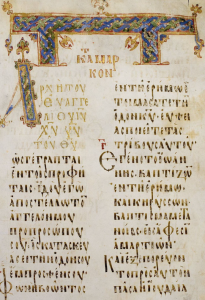
The beginning of Mark in the Codex
Boreelianus, an uncial manuscript probably
from the 9th cent.
f. life: It’s hard not to translate the word ψυχή [psüchē] as “life” in this context. However, it can also be translated “soul,” and generally is so translated in the very next verse—which is, perhaps, most familiar to us in an altered form, the mournful, magnificent line given to St. Thomas More in A Man For All Seasons:
Why, Richard, It profiteth a man nothing if he sell his soul for the whole world; but for Wales?
Footnotes
1It’s by no means impossible—the only thing making it unlikely is that St. Peter would have had no reason to preach in the Catacombs. There are Christian burials in the Catacombs, but the story one sometimes hears that Christians lived in them is a romantic exaggeration, although liturgies probably were celebrated there at least periodically.
2Also, this is not the summer of 1903 in Least Dumpstershire; we do not need to collect thruppence ha’penny in a saucepan to bring to the Earl of Bubble and Squeak, and we don’t need to call swimsuits “bathing costumes” either.
3I.e., “rate,” the descendant of the Old Norse verb hrata “to find fault with,” doesn’t seem to be current in American English. The word “rate,” on the other hand (obviously not to be confused with the unrelated word “rate”), is descended from the Latin ratus, meaning “considered, adjudged, ‘gone over’,” and this verb is perfectly normal in American English as in other dialects.
4I don’t believe I’ve gone into the Greek definite article much on this site. Suffice it to say, “the” did a lot more work in Greek than it does in English, almost rising to the level of a miscellaneous pronoun.


